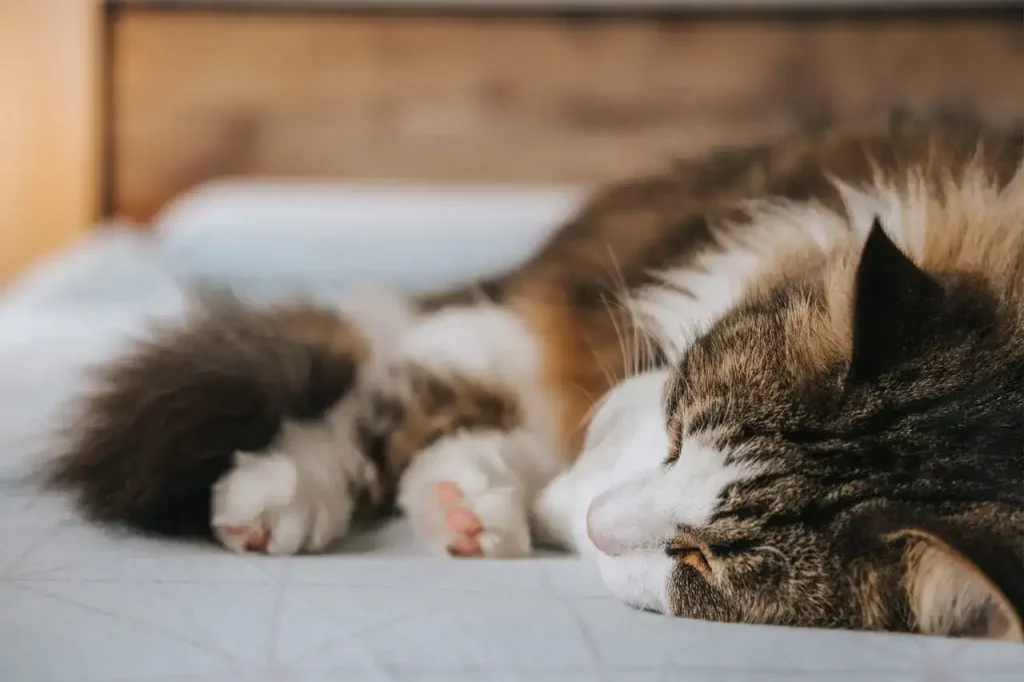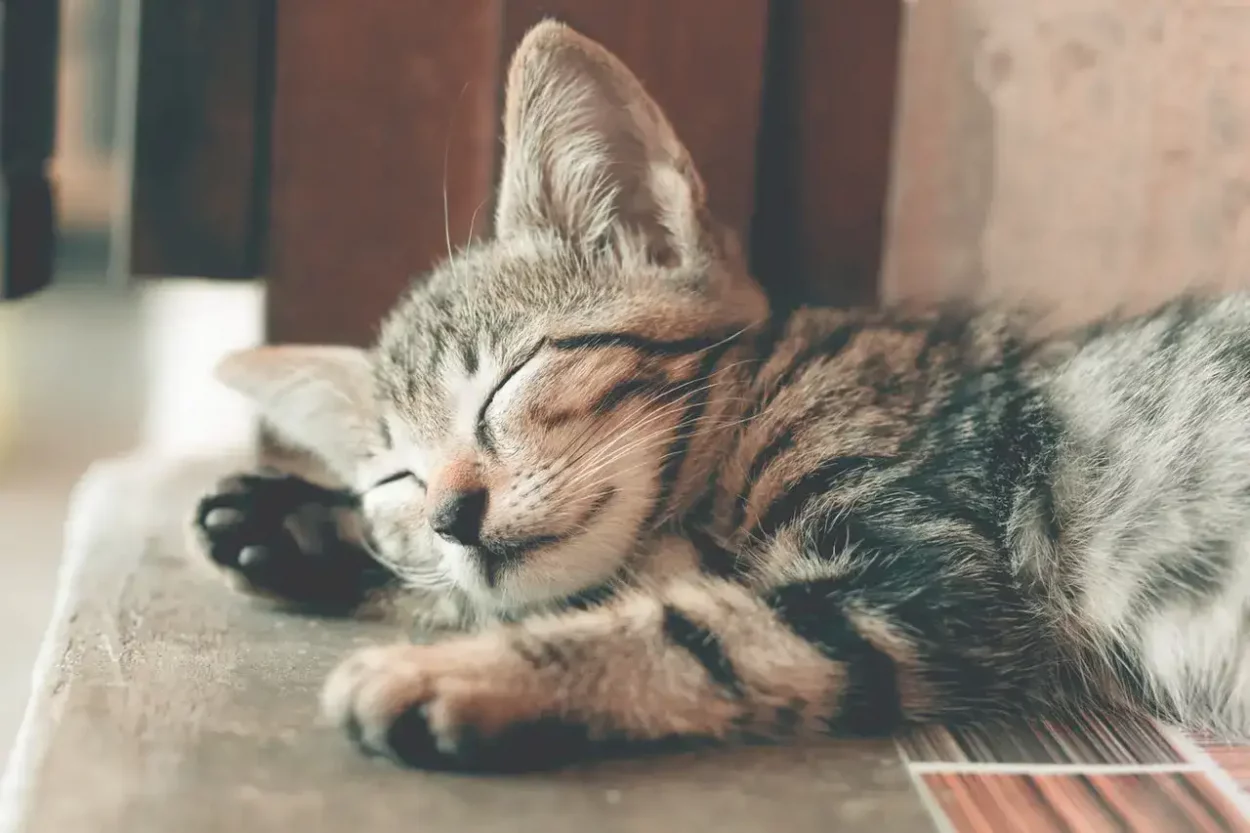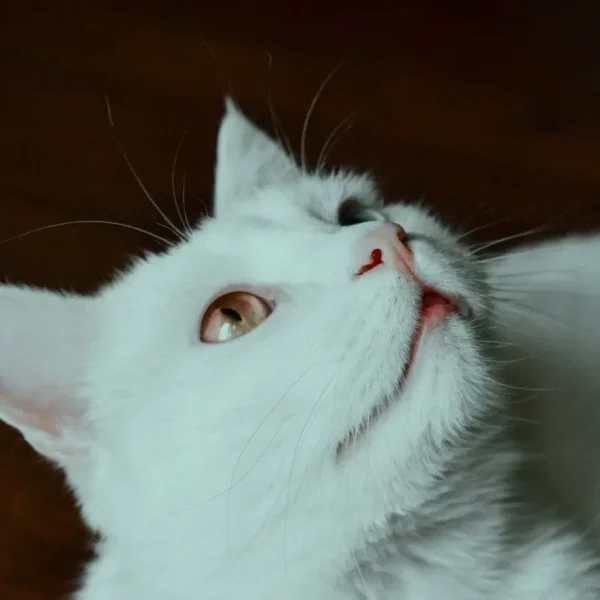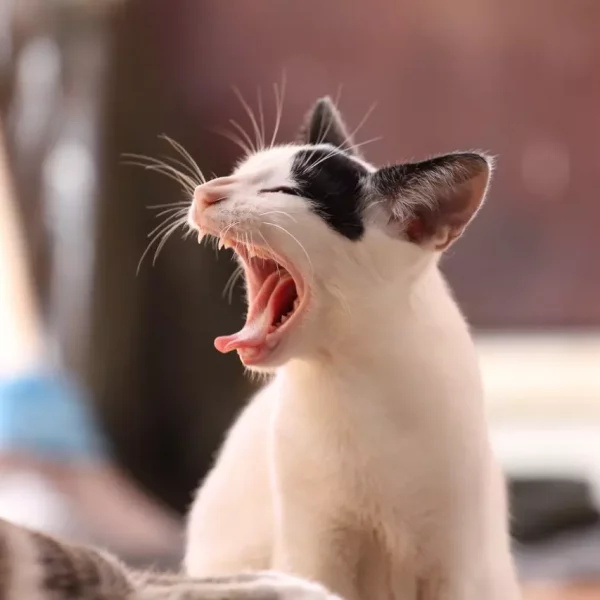For many pet parents, taking care of a kitten for the first few weeks of ownership can be an intimidating and scary experience. Like human babies, kittens can appear very fragile… you will worry constantly.
One such worry is when you see a kitten rapidly breathing whilst they sleep. It can be freaky, and you might think this breathing fast is a sign of something wrong. Here’s what it means.
Why do kittens breathe to fast when they sleep? Many kittens will have rapid breathing as they sleep, often when they are in a deep sleep and dreaming. It’s very common with kittens. However, there can be other reasons for fast breathing in sleep, explained below.
Why Does My Kitten Breathe Fast When Sleeping?
In general, a faster rate of breathing in kittens should not be an immediate cause for concern. Compared to their adult counterparts, kittens naturally breathe much faster, especially during sleep – this is completely normal and nothing you should find too alarming.
However, the chances are you have probably only noticed your kitten’s rapid breathing when you have been woken up by the sound in the middle of the night. The reason for this comes down to the REM cycle, a stage of sleep that both humans and cats, and many other mammals and birds, all share in common.
REM, or rapid eye movement, occurs when cats enter a phase of sleep characterized by the rapid movement of their closed eyes.
More often than not, cats will begin to twitch or move in their sleep, and at times, they may even howl, whine, or hiss – often, as a result of their reaction to a vivid and realistic dream that they are experiencing at that moment.
Alongside this, many cats, especially kittens, may begin to breathe at an increased rate during REM sleep. Interestingly, this trait is also shared by human babies, who will regularly scare their parents by suddenly breathing at an elevated rate whilst snoozing.
Although this behavior does happen in adults, it is a lot more common in both feline and human infants.

I understand though; this can make even the calmest cat owner nervous, especially if their kitten shows any sign of abnormal behavior for an extended amount of time.
Thankfully, most kittens are not as delicate as they look, and in most cases, any strange behavior they may show will likely clear up without any real interference from their owners.
Similarly, unlike their human counterparts, kittens are relatively sturdy and can take the occasional tumble without hurting themselves.
Furthermore, it is not unusual for young cats to act strangely for the first few months of their lives, especially whilst in the process of developing the fine skills needed for them to prosper and thrive on their journey towards becoming adult cats.
At times, they may whimper or show other concerning signs of potential pain or distress, only to be as right as rain the following day.
That being said, legitimate health concerns that are worth investigating are not exactly unheard of in young felines, and as such, you should always listen to your gut if you suspect something is amiss with their health and talk to a vet.
Sadly, it is not uncommon for young kittens to be born with health issues that can plague them throughout their lives.
One of the most common and anxiety-inducing behaviors many young kittens display is rapid breathing whilst sleeping. Across the country, many cat owners are woken up by the sound of their new kittens seemingly struggling or having a hard time breathing.
Naturally, this can be terrifying, and as such, many young kittens are taken to the vet early on in their lives for a diagnosis of what is causing this seemingly serious issue.
What Is The Normal Breathing Rate For A Kitten?
As previously mentioned, kittens tend to breathe much faster than adult cats, even whilst they are awake. In general, older felines will take around 10 to 30 breaths per minute whilst they are resting. However, during rigorous exercise, they may pant up to a staggering 200 times per minute.
When it comes to kittens, their resting breathing rate will normally fluctuate between 18 to 34 breaths per minute. However, they may breathe slightly faster if they have just come home after a long and arduous walk, or if they are experiencing a particularly distressing nightmare.
In terms of panting, it is not unusual for young cats to breathe up to ten times faster than their normal resting breathing rate.
Similarly, stress may sometimes contribute to a slightly elevated breathing rate in felines of all ages. If your kitten has a stressful day at the vet or has had a scary altercation with another cat, they may breathe at a faster rate than normal.
This is fairly typical so long as their breathing does not regularly exceed over 34 breaths per minute.
How Do You Test Your Kitten’s Breathing Rate?
If you find yourself unsure whether your kitten’s breathing rate is healthy or normal, you can try testing it at home. First and foremost, to measure this accurately, you should wait until your kitten is sleeping soundly (i.e. not dreaming or moving around in its sleep).
From here, all you need to do is grab your phone and begin observing your kitten’s chest for movement; it will naturally rise and fall as they breathe in and out (one breath includes both the inhale and exhale).
Set a timer on your phone for 30 seconds, and carefully count how many breaths your kitten takes in that duration.
Once you have finished this, multiply the number of breaths you have recorded by 2 to get their approximate breathing rate for 1 minute.
However, if you are worried about the accuracy of this recording being slightly off, you can always count the entire 60 seconds by continuing to watch your cat breathe. Open your notes and jot down what you have recorded.
Once you have done this several times, save the notes and add to them through the week by continuing to measure your kitten’s breaths.
Eventually, you should become very familiar with your kitten’s standard breathing rate and this will help you to decide whether anything is amiss when you notice they are breathing strangely.
If you do notice any abnormalities (breathing rate regularly spiking above what is considered normal or a sudden and extreme change), contact your vet and request an appointment for a check over.
In most cases, your kitten will be completely fine, however, it is always best to take preventative measures just in case of an emergency.
When Should You Be Concerned?
Although rapid breathing in kittens is almost always normal, several medical conditions can cause this phenomenon to occur as well. Therefore, you should be made aware of these conditions if you want to keep your kitten from any potential harm.
Additionally, you should always contact your vet if you feel that your kitten’s breathing rate sounds labored or if they are wheezing or coughing heavily in their sleep. Below, we will outline several medical conditions you should be on the lookout for.
Lung Conditions
Although reasonably rare in kittens, prolonged rapid breathing can sometimes be a sign of a lung-related condition. In most cases, these conditions are relatively mild and treatable, with cat shelter cough and asthma being particularly easy to treat. However, in rare instances, kittens may develop conditions that can cause severe bleeding in the lungs if left untreated. If you notice your cat is experiencing chronic bouts of coughing and is struggling to breathe while exercising or sleeping, take them to the vet as soon as possible.
Heart issues
In some cases, rapid breathing can be a sign that your kitten might be experiencing heart issues or even heart failure. However, the good news is that this is extremely rare in young cats, especially if they have not been diagnosed with an existing heart condition. That being said, you must rule out this condition if your kitten is experiencing breathing issues as heart issues are often fatal if left untreated.
Anemia
Anemia is a condition that occurs when a cat’s immune system mistakenly begins attacking its red blood cells. Kittens suffering from this serious medical issue will breathe more rapidly due to a lack of oxygen circulating through their blood cells. Thankfully, if caught early, many cases of anemia can be treated, managed, or even cured with the right medication and treatment from your vet.
Conclusion
The first few months after bringing a new kitten home are often both a joyful and anxious experience for all cat owners. Although it is a delight to watch them play with their toys and explore their world, it is also anxiety-inducing when they exhibit unusual behaviors or bizarre traits.
When your kitten breath so fast when sleeping, it’s something that can be distressing, particularly if this is your first time owning a cat.
It is true that kittens are prone to health issues during their formative months, it’s not always cause for concern. But please consult your vet if you are at all unsure. I am not a vet, this guide is purely based on experience and my own research.
Every year, countless kittens are taken to the vet by their worried pet parents, only for them to find out that their cat is in perfect health. Despite this, being cautious is not a bad thing when it comes to your kitten’s well-being.
But being able to spot the difference between a health issue and a personality trait can prove difficult for untrained eyes, and sometimes a trip to the vet is the only sensible course of action to prevent a serious problem from occurring.



Leave a Comment